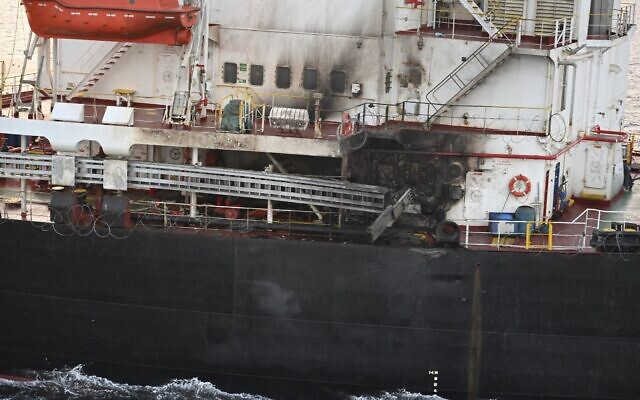Houthi chief vows to step up Red Sea strikes as group confirms Eilat attack
Abdulmalik al-Houthi also claims use of ‘submarine weapons’ without elaborating; US says six drones threatening warships shot down
 Abdul-Malik Badruldeen al-Houthi, the leader of the Houthi rebels
Abdul-Malik Badruldeen al-Houthi, the leader of the Houthi rebelsYemen’s Iran-backed Houthis will escalate their attacks on ships in the Red Sea and other waters and have introduced “submarine weapons,” in continued solidarity with Palestinians in the Gaza war, the group’s leader said on Thursday.
The group also confirmed firing ballistic missiles and drones at the Israeli city of Eilat, a cargo ship in the Gulf of Aden and a US destroyer in the Red Sea.
Iran-aligned Houthi rebels in Yemen have launched repeated drone and missile strikes against Israel and in the Red Sea, Bab al-Mandab Strait and the Gulf of Aden since November in support of Palestinians, as the Israel-Hamas war continues.
The offensive against the terror group began on October 7 when thousands of Hamas gunmen invaded Israel’s south, killing some 1,200 people and taking 253 hostages.
The Houthis say the strikes are in solidarity with the people of Gaza, where the Hamas-run health ministry says more than 29,000 people have been killed in the conflict, a figure that cannot be independently verified and includes some 12,000 Hamas terrorists Israel says it has killed in battle. Israel also says it killed some 1,000 gunmen inside Israel on October 7.
“Operations in the Red and Arabian Seas, Bab al-Mandab Strait and the Gulf of Aden are continuing, escalating and effective,” Yemeni leader Abdulmalik al-Houthi said in a televised speech. He gave no details of the submarine weapons.
The group’s strikes are disrupting a route accounting for about 12 percent of global maritime traffic and forcing firms to take a longer, more expensive route around Africa.

In a later televised speech, the group’s military spokesman Yahya Sarea said they conducted three military operations: targeting the Islander ship in the Gulf of Aden with naval missiles, Israel’s Eilat with ballistic missiles and drones, and an American destroyer in the Red Sea with a number of drones.
Only the strike on the Islander reached its target, according to authorities.
Two missiles set ablaze a ship some 70 nautical miles southeast of Aden, Yemen, the United Kingdom Maritime Trade Operations (UKMTO) agency said, referring to the UK-owned, Palau-flagged Islander, which was en route to Egypt from Thailand, according to maritime security firm Ambrey and its analytics branch and ship tracking data.
The vessel and crew were reported safe and proceeding to the next port of call, it said in a later update.
The US military said the attack caused damage and one minor injury.
Israel’s military said it shot down a long-range ballistic missile using the Arrow air-defense system after sirens warning of incoming rockets and missiles sounded in the southern city of Eilat.
And the US Central Command said in a social media post that it downed six Houthi drones in the Red Sea after they were identified as an imminent threat to US and allied warships.
The speeches came the same day the Houthis sent shippers and insurers formal notice of what they termed a ban on vessels linked to Israel, the US and Britain from sailing in surrounding seas, seeking to reinforce their military campaign in support of Palestinians.
The Houthis’ communication, the first to the shipping industry outlining a ban, came in the form of two notices from the terror group’s newly dubbed Humanitarian Operations Coordination Center sent to shipping insurers and firms.
Ships that are wholly or partially owned by Israeli individuals or entities and Israel-flagged vessels, or are owned by US or British individuals or entities, or sailing under their flags, are banned from the Red Sea, Gulf of Aden and the Arabian Sea, Thursday’s notices said.
“The Humanitarian Operations Center was established in Sanaa to coordinate the safe and peaceful passage of ships and vessels that have no connection to Israel,” a senior Houthi official told Reuters on Thursday.
Risk priced in
The attacks have disrupted global trade and reset shipping rates at a higher level. Shipping and insurance sources on Thursday said there was no change in rates since the issuance of the advisories.
“The Houthis have already targeted shipping with those links (to Israeli, US, and UK commercial interests) and there is an elevated alert with sailing already,” one shipping source said.
Al-Houthi said the attacks would mirror escalations of Israel’s military operations in the Gaza Strip, and that retaliatory strikes by the US-British coalition have failed to stop its campaign.
The group’s attacks show little sign of abating, despite US and British forces’ retaliatory strikes on Houthi facilities that began in January.
No ships have been sunk nor crew killed, however, there are concerns about the fate of the Rubymar cargo vessel which was struck on February 18 and its crew evacuated.

The Houthis said the Rubymar was at risk of sinking but a US defense official said as of Thursday the ship remained afloat.
Rubymar “is sitting lower still in the water,” said Harry Pearce of Ambrey Analytics, part of maritime risk firm Ambrey. “A salvage has reportedly been attempted (yesterday), but aborted,” he said, adding a navigation warning to nearby ships was in place.
Options for the still floating ship are being considered, the vessel’s security company ISS-SAPU told Reuters on Thursday. ISS-SAPU was involved in assisting the rescue efforts of the crew.
2 comments:
Carpet bomb that whole end of the country. Turn it into a parking lot.
As long as the USA is being lead by a weak President the attacks will continue.
Post a Comment